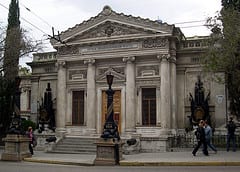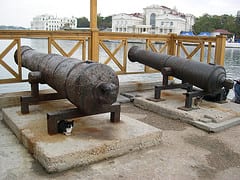In the end of September I was able to participate in a conference organized by five associations of the sobriety movement and the treatment system, in Sevastopol, Ukraine. I brought back a lot of new experiences – but also questions and tasks – to Western Europe.

Panorama Museum where a diorama–like circular display tells the story of the Crimean War siege of Sevastopol


About 3 kilometers (2 miles) outside of Sevastopol are these ancient Greek Ruins. They are known as the Russian Troy, and display signs of Roman and Byzantine culture along with Greek
The first important lesson: borders are relative. Although the “Iron Curtain” fell more than 20 years ago, there are still many limitations. The language plays a crucial role. In the Commonwealth of Independent States (CIS) countries, it is still possible to carry out an “international” conference and to speak only Russian. This continues concerning the basic work. The main articles and texts of the alcohol and addiction literature are either written in English or Russian. And they are not known in the other parts of the world.
The second lesson: We know, but there’s always more to learn. As just one example the method of G. A. Shicko was named. Many conference participants, who had overcome their own dependency, swear by this method. The portrayals of the officials on the success rates allow only two conclusions: either it is grossly exaggerated, or we in the West are well advised to deal quickly with this method and adapt it if necessary.
A third conclusion: It’s not all – maybe just a little – to explain logically. On one side, there are a lot of efforts to help people get out of their dependence, and people rely on the goals of the World Health Organization (WHO) in the alcohol field. On the other side addiction is identified as a social problem, and the classification system of diseases of WHO, the ICD, is not noted.
It was a meeting of absolute opposites in countries still in transition. Old socialist embossed working methods were group dynamics oriented seminars opposite, a “Round Table” discussed what could be done for children and youth (and the re-introduction of the pioneering work was one of the sincere suggestions), while in the next seminar a former boxer talked about how children in their situation and their needs, and they could pick up support.
Meetings of absolute contrasts with the reliance on international organizations like IOGT International of which promises to help you on the way forward. Most like a confirmation that everything that you do now, really is. But also a platform for professional exchange and new contacts. This task has to face IOGT International. The alcohol-related problems are huge, there are many questions. The answers have to be found in the countries of the CIS, but IOGT can help with its global experience in answering.